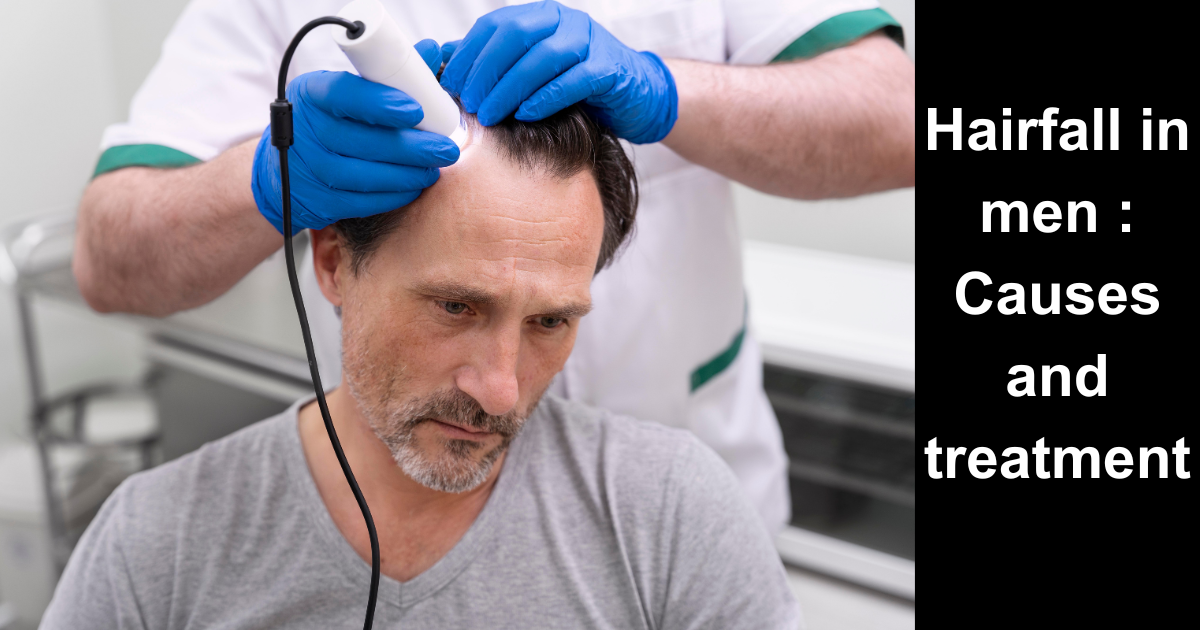Introduction
Hair fall is a common concern in both men & women. But don’t panic it is normal to lose some hair daily. However, if you lose excessive hair loss it is a concern. Understanding the causes and available hair fall treatments is essential for managing and preventing further hair loss. In this blog, we’ll explore the various factors contributing to hair fall in men in particular and discuss effective treatments to help you maintain a healthy head of hair.
Causes of Hairfall in Men
Genetics (Male Pattern Baldness): One of the most common causes of hair fall in men is genetic predisposition. Male pattern baldness, also known as androgenetic alopecia, is inherited and can start as early as in their twenties.
Hormonal Changes: Fluctuations in hormones, particularly dihydrotestosterone (DHT), play a significant role in hair fall. This Hormone can shrink hair follicles, in turn rendering them ineffective to support healthy hair growth.
Stress: High levels of stress can trigger a condition known as telogen effluvium, where hair prematurely enters the resting phase and falls out. Reducing stress through relaxation techniques can help mitigate this cause.
Diet and Nutrition: Poor dietary choices and nutrient deficiencies, especially in key vitamins and minerals like biotin, zinc, and iron, can contribute to hair fall. A balanced diet is recommended.
Medical Conditions: Certain acute & chronic medical conditions, viz. thyroid disorders, scalp infections, and autoimmune diseases can lead to hair loss. Managing these underlying health issues can help prevent further hair fall.
Medications: Some medications, like chemotherapy drugs, blood thinners, and antidepressants, list hair loss as a side effect. Consult your healthcare provider if you suspect a medication is the cause of your hair fall.
Hairfall Treatment Options
Minoxidil: This over-the-counter topical solution is FDA-approved and has been shown to promote hair growth and slow hair loss. It’s applied directly to the scalp.
Finasteride: A prescription medication that inhibits the production of DHT, finasteride can help prevent further hair loss and even regrow hair in some cases.Finasteride: A prescription medication that inhibits the production of DHT, finasteride can help prevent further hair loss and even regrow hair in some cases.
Low-Level Laser Therapy (LLLT): LLLT devices, such as laser combs or helmets, stimulate hair follicles and promote hair regrowth.
Platelet-Rich Plasma (PRP) Therapy: PRP involves injecting a patient’s concentrated blood plasma into the scalp to stimulate hair follicles.
Hair Transplant Surgery: In cases of advanced hair loss, hair transplant procedures like follicular unit transplantation (FUT) or follicular unit extraction (FUE) can be effective in restoring a full head of hair.
Diet and Lifestyle Changes: A balanced diet rich in essential nutrients, regular exercise, and stress management techniques can help improve overall hair health.
Topical Hair Growth Shampoos and Serums: Some shampoos and serums contain ingredients like ketoconazole, caffeine, or biotin, which may promote hair growth and strengthen existing hair.
Scalp Care: Proper scalp hygiene and care can help prevent hair fall due to scalp infections or issues like dandruff.
Conclusion
Hairfall in men can be caused by a variety of factors, but with the right understanding and treatment options, you can take steps to combat it effectively. Whether you choose topical solutions, medications, lifestyle changes or your hair fall treatment, consulting the best Dermatologist in Bangalore is essential to determine the best course of action for your specific situation instead of a dermatologist near me. Remember, early intervention often yields the best results, so don’t hesitate to seek help if you’re experiencing excessive hair loss.

